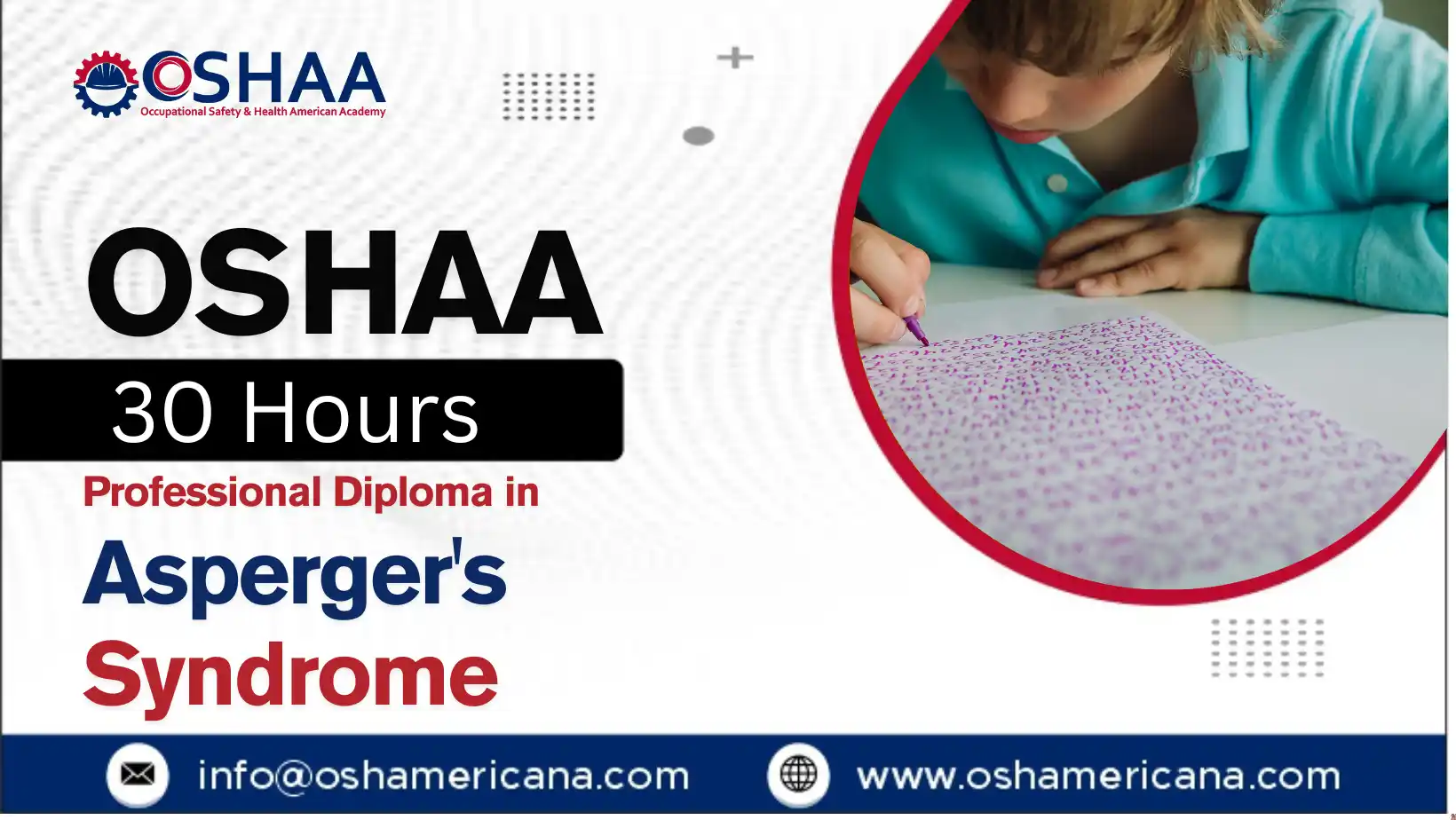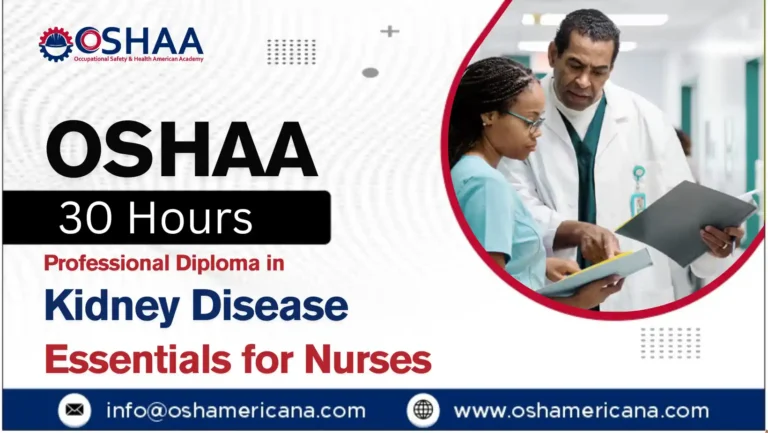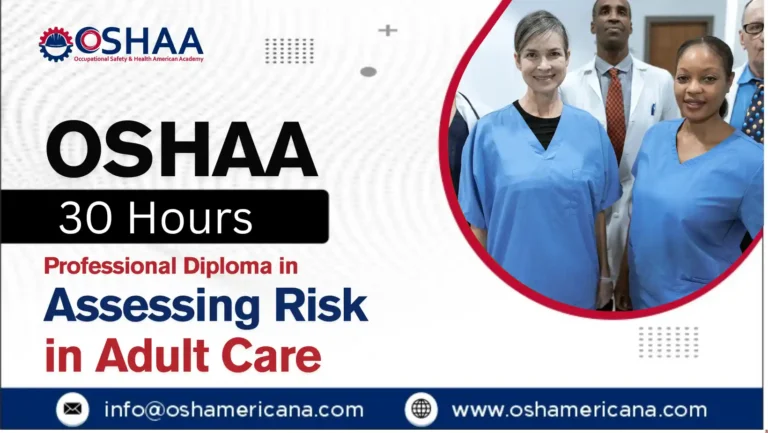The OSHAA 30-Hours Professional Diploma in Asperger’s Syndrome is a specialised training programme designed to provide participants with a thorough understanding of Asperger’s Syndrome and its impact on individuals across various stages of life. This course combines evidence-based theory with practical approaches to equip participants with the knowledge and tools required to offer informed, respectful, and effective support.
This diploma focuses on helping participants explore the characteristics, experiences, and support needs of individuals with Asperger’s Syndrome. It encourages reflection on both individualised and systemic approaches to support, while challenging myths and misconceptions surrounding the condition.
The OSHAA diploma is suitable for participants working in education, healthcare, counselling, social services, or community support. It also benefits those in administrative or managerial roles aiming to develop inclusive practice, and individuals seeking to better understand family members, peers, or clients with Asperger’s Syndrome.
Following successful completion, participants may pursue further training in autism support, special educational needs, psychology, or social work. The diploma also complements professional qualifications in teaching, therapy, or health and social care.
The OSHAA 30-Hours Professional Diploma in Asperger’s Syndrome empowers participants with the insight and tools to provide meaningful, respectful support to individuals on the autism spectrum. By promoting understanding, empathy, and practical action, this course plays a vital role in building more inclusive environments where neurodiverse individuals can thrive.
OSHAA 30-Hours Professional Diploma in Asperger’s Syndrome
Study Units
Learning Outcomes
Introduction to Asperger’s Syndrome and the Autism Spectrum (3 hours)
- Understand the key features of Asperger’s Syndrome within the autism spectrum
- Explore historical and contemporary perspectives on the condition
- Recognise the diversity of experiences and presentations among individuals
- Develop an awareness of the strengths and support needs associated with Asperger’s Syndrome
Diagnostic Criteria, Early Signs, and Assessment Methods (4 hours)
- Identify formal diagnostic criteria for Asperger’s Syndrome
- Recognise early indicators across different age groups
- Understand the assessment tools and referral processes used by professionals
- Explore the importance of timely identification and multidisciplinary evaluation
Social Communication and Interaction Differences (4 hours)
- Understand the unique communication styles often associated with Asperger’s Syndrome
- Identify common challenges in social interaction and relationship building
- Learn strategies to support effective communication and mutual understanding
- Explore the role of social scripts, visual supports, and structured interactions
Sensory Processing and Behavioural Patterns (4 hours)
- Understand the impact of sensory sensitivities on behaviour and daily life
- Identify common sensory triggers and behavioural responses
- Learn how to create sensory-friendly environments
- Apply techniques for supporting regulation and coping strategies
Cognitive Strengths, Challenges, and Learning Styles (6 hours)
- Recognise the diverse cognitive profiles of individuals with Asperger’s Syndrome
- Understand common strengths such as attention to detail and strong memory skills
- Identify learning differences and support personalised approaches to education
- Explore practical methods to build on strengths and address specific learning needs
Mental Health and Emotional Regulation in Asperger’s Syndrome (3 hours)
- Understand the link between Asperger’s Syndrome and common co-occurring mental health conditions
- Recognise signs of anxiety, depression, and stress in autistic individuals
- Learn techniques to support emotional awareness and regulation
- Explore ways to promote mental wellbeing and resilience
Educational Strategies and Supportive Learning Environments (4 hours)
- Identify inclusive teaching practices that support learners with Asperger’s Syndrome
- Understand the importance of structure, routine, and predictability in educational settings
- Apply classroom strategies that enhance focus, understanding, and participation
- Collaborate effectively with families and support teams to develop tailored plans
Workplace Support and Transition Planning (2 hours)
- Understand the challenges and strengths individuals may experience in employment
- Learn how to support transitions from education to work environments
- Identify workplace adaptations that promote inclusion and success
- Explore the importance of mentorship, communication, and long-term planning
Course Benefits: OSHAA 30-Hours Professional Diploma in Asperger’s Syndrome
- Develops a comprehensive understanding of Asperger’s Syndrome and its place within the autism spectrum
- Equips participants with practical strategies to support communication, sensory needs, and learning differences
- Enhances confidence in identifying early signs and understanding diagnostic processes
- Builds awareness of mental health challenges and how to promote emotional wellbeing
- Prepares participants to create inclusive educational and workplace environments
- Encourages strength-based approaches that recognise and support individual abilities
- Offers tools to promote independence, daily living skills, and social inclusion
- Improves collaboration with families, professionals, and support networks
- Supports ongoing professional development in education, health, or care sectors
- Provides a foundation for further study or specialisation in autism support and neurodiversity advocacy
The OSHAA 30-Hours Professional Diploma in Asperger’s Syndrome is designed for participants who support or interact with individuals on the autism spectrum in professional, educational, or community settings. It is particularly suited for:
- Educators and teaching assistants working in mainstream or special education
- Healthcare professionals, therapists, and support workers involved in developmental or behavioural services
- Social care providers and youth workers supporting neurodiverse individuals
- Employers, managers, or HR professionals aiming to foster inclusive workplaces
- Family members or carers seeking a deeper understanding of Asperger’s Syndrome
- Anyone interested in enhancing their skills to support neurodiversity in everyday life
This diploma welcomes participants from all backgrounds who are committed to promoting respect, inclusion, and effective support for individuals with Asperger’s Syndrome across different environments and life stages.







